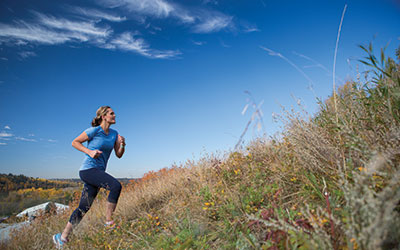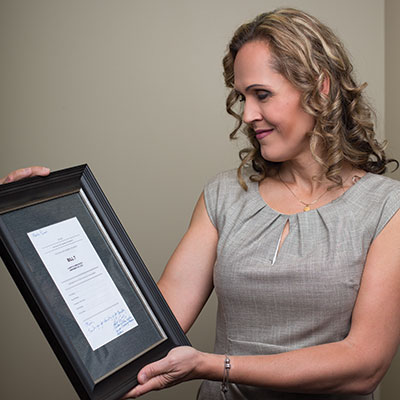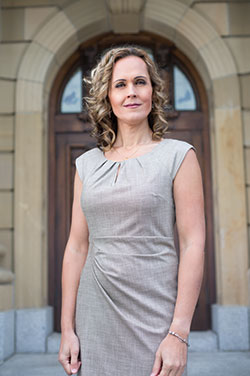The Marni Panas of a few years ago wouldn’t have been happy with her performance in the 2015 Edmonton Marathon. A veteran long-distance runner, Panas (Management ’91, Computer Systems Technology ’02) was used to finishing among the top 15 per cent. She’d train obsessively, meticulously logging distance and time. In 2005, she earned bronze at the International Masters Games 10K in Edmonton. Her best marathon time is 3:18 – well above 2014 medians for both men and women in the U.S.
But in Edmonton last year she clocked a lacklustre 4:10. It didn’t matter. She’d brought a new perspective to running. “The weather was perfect, the sun was beautiful, the sky was blue,” says Panas. “It was one of my favourite races ever – even though I was a half-hour slower.”
The reason was that Panas’s body had changed. It was the first time she had run the event as a transgender woman. She transitioned over the two previous years, a process involving numerous physical changes and psychological therapy. Any benefits of masculinity were lost, she says. “I’m slower, my muscle mass has changed, my endurance has changed.”
She sees the other benefits, however, as unequivocally positive. The most significant is achieving a state of happiness that the 45-year-old woman hadn’t previously known. The change means living “authentically,” says Panas, and accepting who she is and expressing that freely. It has also made her one of Alberta’s most visible and vocal advocates for transgender rights.
Speaking up for herself has put her in positions of influence.
While she doesn’t claim to speak for the community, speaking up for herself – whether that means facing detractors at protests or tackling trolls online with a firm, sometimes fiery, brand of education – has put her in positions of influence.
As a member of the employee relations and workforce strategy group at Alberta Health Services, she helps to promote inclusivity for more than 108,000 employees. As part of a group involved in writing gender identity and expression into the province’s Human Rights Act, she has contributed to creating a similar environment for more than 4 million people.
And yet, as any marathoner knows, there is still much work to be done and many miles to go. Arguably, she’s never been in better condition to do what she feels is necessary for advancing transgender rights, because that sluggish marathon was a revelation. “What was interesting was that when I transitioned and found peace within myself, it didn’t really matter,” she says. “I knew that, from this point on, I’d just have a series of personal bests.”
 A life spent preparing
A life spent preparing
It’s easy to see Panas’s life as preparation for her role as a champion of diversity and inclusion. Though a long-time Edmontonian, she grew up in Camrose, a small city 100 kilometres southeast. Panas came into the world, she explains, as the gender she is today.
“I was never born a boy and changed into a girl. I was assigned male at birth because I happened to be born with a penis but I’ve always been a girl.”
As a kid, she didn’t talk about that identity. Gender roles were clear. “I knew if I deviated from what was expected of me as a boy or a man, it would be a problem,” says Panas. “So you get really good at keeping a secret and you get really good at being by yourself because that’s where your secret is safest.”
She doesn’t blame the place so much as the times. There weren’t words to explain the difference between herself and others. “We didn’t have the language we have today,” says Panas. “I didn’t hear the word transgender until I was in my 30s.”
By then, she’d been living as a man married to a woman since her mid-20s but harbouring an irreconcilable difference between who she was expected to be and who she truly was. “I used to be quite an angry man,” says Panas. Her twin sons changed that. Born 16 weeks premature in 2006, Alex is now the 10-year-old who bikes alongside her during runs and still calls her “daddy.” Andrew, however, didn’t survive.
“For me it really brought out the importance of living life true, living life without regret, appreciating each special moment.”
“When you’re caring for your sick kids and your son is taking his last few breaths in your arms, clearly it changes you in many ways,” says Panas. “For me it really brought out the importance of living life true, living life without regret, appreciating each special moment.” She realized that her marriage, her job, even her life were at stake if she couldn’t fully express who she was. “I started my transition [then] because you only get one chance at this. It changed everything for me.”
It also made her aware of the importance of speaking out for others trying to live true to themselves. Panas has helped a young transgender girl in a battle to use female washrooms in an Edmonton Catholic school. She has volunteered as an informal mentor for Camp Fyrefly, a leadership retreat for LGBTQ youth. As a director at large for the Edmonton Pride Festival Society, she has helped organize events that give the local LGBTQ community an opportunity to celebrate diversity with the city. Throughout the year, she’s a guest speaker at Edmonton post-secondary institutes and is a private consultant for organizations looking to create inclusive environments.
Panas brings the same skills, enthusiasm and insight to her work at AHS. “Marni really has an ability to make a connection with people,” says her supervisor, Mona Sikal. “They get that she is about bringing your whole self to work. I think that really resonates with people.” This isn’t just about gender, Sikal adds. “All of us have the same want and need to be who we are in a safe, accepting place.”
At the close of 2015, Panas saw some of the farthest-reaching results of her efforts yet. With her input and that of others in the LGBTQ community, the provincial government amended the Alberta Human Rights Act. That is, Panas helped turn the language that was lacking for most of her life into laws that protect her right to express it.
 In November of the same year, Kathleen Ganley, minister of justice and solicitor general, introduced Bill 7 in Alberta’s Legislative Assembly. It proposed adding gender identity and gender expression to the list of prohibited grounds of discrimination in the Alberta Human Rights Act.
In November of the same year, Kathleen Ganley, minister of justice and solicitor general, introduced Bill 7 in Alberta’s Legislative Assembly. It proposed adding gender identity and gender expression to the list of prohibited grounds of discrimination in the Alberta Human Rights Act.
“All Albertans should be able to have the same opportunities to be treated with equal dignity and respect,” the minister said during the second reading, her conclusion based in part from hearing stories from Alberta’s transgender community of lost jobs, personal safety concerns, difficulties finding medical treatment or even a suitable public washroom.
Panas participated in drafting the bill and crafting its wording. Today, a copy of it bearing Ganley’s signature hangs in a frame in her office at AHS.
“Marni’s passionate fight for equal rights for transgender individuals made her a vital part of the consultation for Bill 7,” says Ganley. “Her work in her professional career and also her personal experience were key to helping us understand how this amendment could positively impact transgender Albertans.”
Less than a month later, the bill came into force.
“To see this kind of change happening in Alberta – which used to be known as Texas of the north, the most conservative province in the country – is a remarkable shift,” says Dr. Kristopher Wells, faculty director for the University of Alberta’s Institute for Sexual Minority Studies and Services, and another consultant for Bill 7. “And it takes that courage and that visibility of people like Marni to put a face to the importance of what those kinds of changes to legislation actually mean. These words can literally impact and save people’s lives.”
Wells, who counts Panas among his friends, sees her as a “trailblazer,” he says. “They’re the ones we look back on and say, ‘that’s when things began to change.’ Because of the courage, the tenacity, the resiliency of the people who wouldn’t back down.”
He notes, however, that the role comes with risk. Like him, he points out that Panas has faced backlash and threats that will likely continue despite legislation. “The battle for social equality is much longer and much harder – to change people’s hearts and minds.”
 Being vulnerable could be said to be a key part of Panas’s advocacy. At her 25th high school reunion in Camrose, she shared her story with classmates and made new friends of some she’d never spoken with before.
Being vulnerable could be said to be a key part of Panas’s advocacy. At her 25th high school reunion in Camrose, she shared her story with classmates and made new friends of some she’d never spoken with before.
When she travelled to Ottawa for the introduction of Bill C16, which would write protection for transgender people into the Canadian Human Rights Act and the Criminal Code, she was interviewed on CNN where she came out to the world, something she struggled to do with her parents just a few years earlier. And she keeps an open letter to her family online describing her transition.
“I save it there for my son to read one day,” she says.
Being as open as Panas is about her story often means having to defend it. “When we’re being silent,” she says, “we’re being complicit.”
One instance of not backing down occurred this summer at an anti-Bill 10 protest at the legislative grounds. Passed by the previous government, the bill seeks to give students the right to organize gay-straight alliances – a struggle still going on in some Alberta schools. As media hovered, Panas confronted a protestor who repeatedly called her “sir.”
“So finally I said, ‘I told you four times not to call me sir,’” recalls Panas. “And by this time I knew all the cameras were watching.” She turned to the crowd and said, “Is that a sign of respect?” The result was news coverage discussing the importance of the bill – the kind of education Panas tries to provide opponents, in person or online, to “hopefully inspire some empathy, some compassion, some opportunities to learn, opportunities for people to be allies [and] step up and support.”
This is one reason Tim Ira is excited about the prospect of bringing her to speak at NAIT’s annual Pride Week. The student programs coordinator says Panas can be tough, but “what she’s able to do is boil everything down to a place of people respecting people, which, at the end of the day, is something that we all expect and want.”
Just as importantly, however, Ira sees her as inspirational. Because of her success following her transition as well as her contributions to the community. “She really makes things feel like they’re possible,” he says.
“She really makes things feel like they’re possible.”
An Instagram post from an Edmonton Pride Parade makes a similar suggestion. It’s a picture of someone in a park with Panas. She’s wearing a red dress and a tiara and has an arm around the person. The writer of the post talks about attending the event to find Panas – “the person who gave me the strength to come out to my family. … This last year has been amazing for me in terms of being accepted for who I am and I couldn’t have done it without this woman.”
But the post is as cautious as it is celebratory. The writer’s name is blurred out, so is the face. There are still potential prices to be paid for admissions like this. Panas’s parents and siblings, for instance, are estranged as a result of her transition. Though her partner was supportive throughout the process, their marriage ended this year. And Panas knows, for her own safety, that there are times she needs to remain quiet about who she is.
“Are we still fearful today?” Panas asks. “Yes. Not a day goes by that I don’t come out of a public washroom and think, is this going to be the day that someone tells you that you don’t belong here and you get beat up for it?” Given that her voice sounds vaguely masculine, Panas doesn’t speak in washrooms.
She also knows, however, that the process of belonging is well underway, with perhaps the hardest part behind her. “It doesn’t take courage to finish a marathon,” says Panas, who will run in the 2017 World Masters Games in New Zealand – competing, for the first time, with women thanks to recent rule changes regarding transgender athletes. “Anyone can finish a marathon. Taking that first step, that’s what takes courage.”
Getting to the finish line, whatever form it takes, is nevertheless going to be a product of successes and struggles. In Panas’s case, it will be a sum total of life experiences. A difficult past has led her to a point of peace. Marcel is no longer her first name but it’s part of her second, as Marcelle.
“I still honour who I was because all those things that happened for good or for bad are part of who I am today – and I like who I am today,” she says. “I wouldn’t change a thing.”
Use it in a sentence
Human rights advocate Marni Panas points out that transgender is an adjective, not a verb or noun.
“I’m not transgendered,” explains Panas. “This isn’t something that happened to me. It’s who I am. ‘Marni is a transgender woman.’ … We would never say, ‘Elton John is a gay-ed man.’ Transgender is the same thing. It puts the person first.”
Shifting society with safe spaces
Since 2014, NAIT’s Safe Spaces program has helped create an inclusive environment for students and staff.
At its heart is a one-day course that covers causes and history of discrimination and offers strategies for creating welcoming classrooms and workplaces, dealing with homo- and transphobia, and supporting those who are coming out. Roughly 300 people have taken the course.
“The LGBTQ community is sizeable and becoming more self-identified here [at NAIT],” says Tim Ira, the student programs coordinator who oversees Safe Spaces. The community has also become more visible with the polytechnic’s annual Pride Week, which includes a pride walk and other social and educational events.
“I’m really proud of where NAIT has come from,” says Marni Panas, whose time at the polytechnic preceded the inclusivity programs by more than a decade. She notes the positive impact Safe Spaces can have on student well-being and, therefore, success in studies and careers. She also points out the effect on our communities.
“It’s really our colleges that often shape society and our future thinkers,” says Panas. She believes students will expect the world outside a post-secondary institute to be equally inclusive. “If it’s not, you start to demand that it is. And that’s exactly how we shift society.”
What's in a name
Even before transtioning, Panas knew her new name would be Marni. It comes from the eponymous popular girl from school who stopped one rainy day to offer Panas a ride. “She didn’t care that she was seen with the dorky kid that I was,” she recalls. “She was just being kind. Years later I’ve thought about that day many times.”
It stayed with her, explains Panas, because of the profound difference a simple act of kindness can make to a life, just as an unkind one – even if unintentional – can cause irreparable harm. “She chose kindness that day,” says Panas.
“I don’t know if I’ve always lived up
to that name, but I try.”